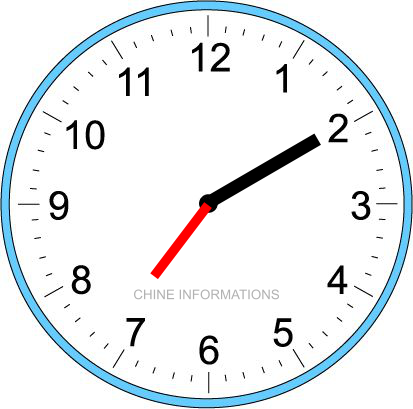
‹ qī diǎn shí fēn ›
This online Chinese audio lesson will teach you to ask and tell the time in mandarin as well as talk about your schedule.
Learn the following vocabulary and train yourself to write the characters and pronounce the words.
| Mot | Pinyin | Traduction | ||
| 1 | 请问 | qǐngwèn | may I ask you ... | |
| 2 | 现在 | xiànzài | now | |
| 3 | 时候 | shíhòu | moment; instant | |
| 4 | 点 | diǎn | o'clock | |
| 5 | 分 | fēn | minute(s) | |
| 6 | 半 | bàn | half | |
| 7 | 刻 | kè | quarter | |
| 8 | 差 | chà | less than | |
| 9 | 课 | kè | class | |
| 10 | 上 | shàng | to go up | |
| 11 | 早上 | zǎoshang | early morning | |
| 12 | 晚上 | wǎnshang | evening | |
| 13 | 上午 | shàngwǔ | morning | |
| 14 | 上班 | shàngbān | to go to work | |
| 15 | 上课 | shàngkè | to attend a class | |
| 16 | 下 | xià | to get down | |
| 17 | 下班 | xiàbān | to get off from work / to finish work | |
| 18 | 下课 | xiàkè | to finish class/ (class is over) | |
| 19 | 下午 | xiàwǔ | afternoon | |
| 20 | 中午 | zhōngwǔ | noon | |
| 21 | 床 | chuáng | bed | |
| 22 | 起床 | qǐchuáng | to get out of bed | |
| 23 | 睡觉 | shuìjiào | to sleep | |
| 24 | 忙 | máng | to be busy | |
| 25 | 什么时候 | shénme shíhòu | when ? |
To give the time without the minutes, simply indicate the number + the character 点 ‹ diǎn ›.
In Chinese, the sentences with a nominal attribute is derived from the verb "to be" 是 ‹ shì › as in the following case:
To also give minutes, we use the characters 分 ‹ fēn › (for "minute"), 刻 ‹ kè › for quarters and 半 ‹ bàn ›for half-hour.

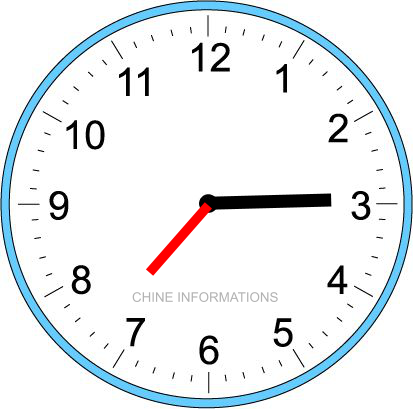
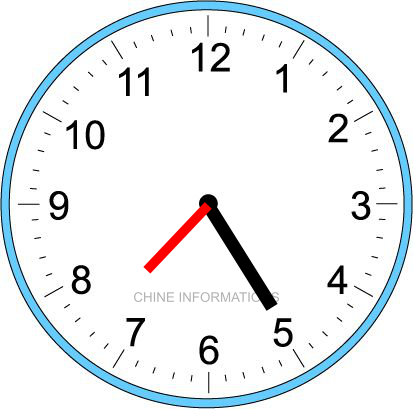
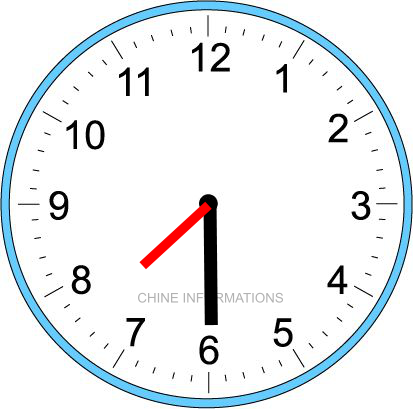
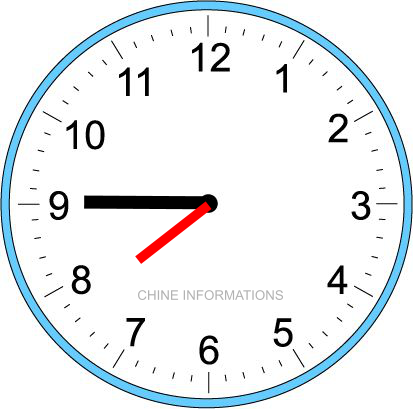
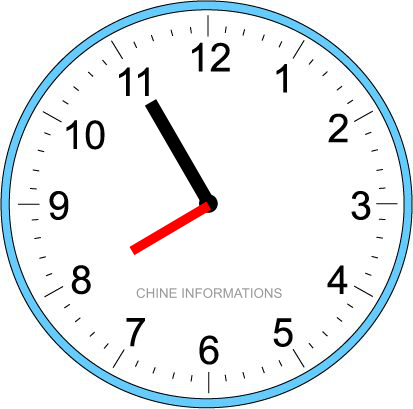

When used as adverbs, temporal terms can be placed between the subject and the verb.
To emphasize the time of an action, the temporal terms can be placed at the beginning of a sentence.
In Chinese, when forming a question, "when" is used and expressed by "什么 时候 <shénme Shihou>". More literally, it should be translated into English by "at what moment".
As this is also a temporal term, it follows the same rule as seen above:
Some Chinese sentences and normally structured, except that the subject is not mentioned. In these cases, it is implied and deduced through the context of the sentence. In most cases it is the same subject as in the preceding sentence.
Read and listen to the two dialogues several times until they are well understood before (possibly) reading the translation.
- 请问,现在几点? ‹ Qǐngwèn, xiànzài jǐ diǎn? ›
- 七点零五分。 ‹ Qī diǎn líng wǔ fēn. ›
- 谢谢! ‹ Xièxiè! ›
- 不用谢! ‹ Bùyòng xiè! ›
- 大卫你好!你今天忙吗? ‹ Dàwèi nǐhǎo! Nǐ jīntiān máng ma? ›
- 今天我很忙。下午六点下课! ‹ Jīntiān wǒ hěn máng. Xiàwǔ liù diǎn xiàkè! ›
Traduction :
- Hello David! Are you busy today?
- Today I am very busy. I finish classes at six o'clock!
- 大卫,你早上几点起床? ‹ Dàwèi, nǐ zǎoshang jǐ diǎn qǐchuáng? ›
- 七点一刻。 ‹ Qī diǎn yī kè. ›
- 晚上几点睡觉? ‹ wǎnshang jǐ diǎn shuìjiào? ›
- 九点半。 ‹ Jiǔ diǎn bàn. ›
- 明天你有课吗? ‹ Míngtiān nǐ yǒu kè ma? ›
- 有。 ‹ Yǒu. ›
- 你们几点上课? ‹ Nǐmen jǐ diǎn shàngkè? ›
- 我们上午八点一刻上课。 ‹ Wǒmen shàngwǔ bā diǎn yī kè shàngkè. ›
- 什么时候下课? ‹ Shénme shíhòu xiàkè? ›
- 中午十二点下课。 ‹ Zhōngwǔ shí'èr diǎn xiàkè. ›
- 你们下午有课吗? ‹ Nǐmen xiàwǔ yǒu kè ma? ›
- 有。四点差十分下课。 ‹ Yǒu. Sì diǎn chà shí fēn xiàkè. ›
- 你哪天没有课? ‹ Nǐ nǎ tiān méi yǒu kè? ›
- 我星期六和星期天没有课。 ‹ Wǒ xīngqíliù hé xīngqítiān méi yǒu kè. ›
Traduction :
- David, at what time do you get up (in the morning)?
- At a quarter past seven.
- At night, at what time do you go to sleep?
- At half past nine.
- Will you have classes tomorrow ?
- Yes.
- At what time are the classes starting?
- Classes start at eight fifteen in the morning.
- At what time do you finish classes?
- At noon at twelve o'clock
- Do you have classes in the afternoon?
- Yes. At three fifty, we finish the classes.
- What days aren't you having classes?
- On Saturday and Sunday, I am not having classes.
1. 你早上几点起床? ‹ Nǐ zǎoshang jǐ diǎn qǐchuáng? ›
2. 晚上什么时候睡觉? ‹ wǎnshang shénme shíhòu shuìjiào? ›
3. 你明天有课吗? ‹ Nǐ míngtiān yǒu kè ma? › / 你明天上班吗? ‹ Nǐ míngtiān shàngbān ma? ›
4. 哪天没有课? ‹ Nǎ tiān méiyǒu kè? › / 哪天不上班? ‹ Nǎ tiān bù shàngbān? ›
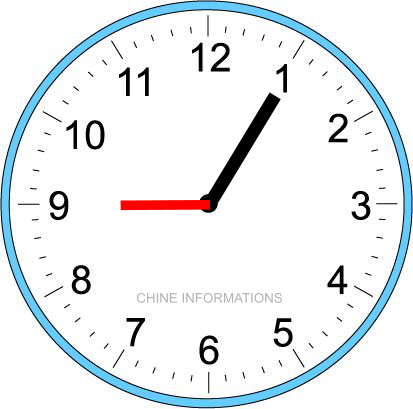
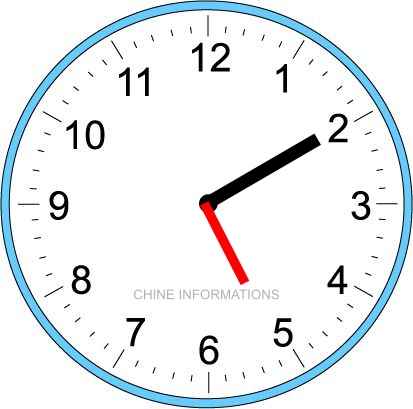
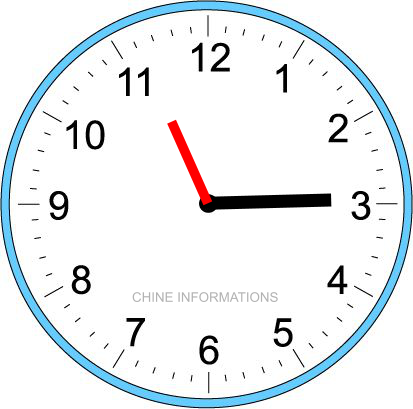
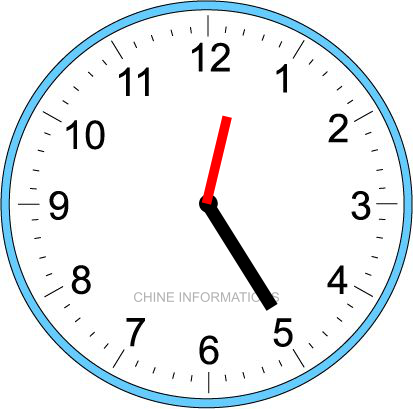
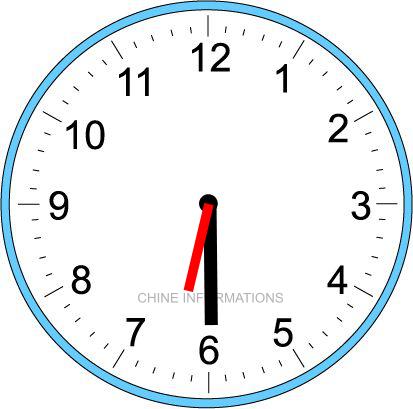
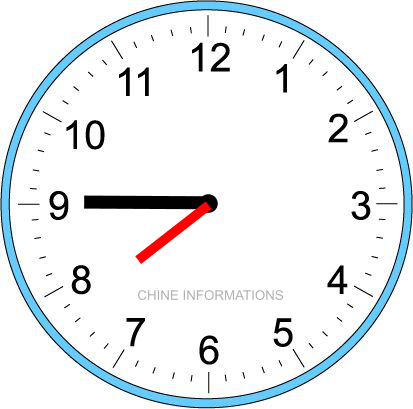
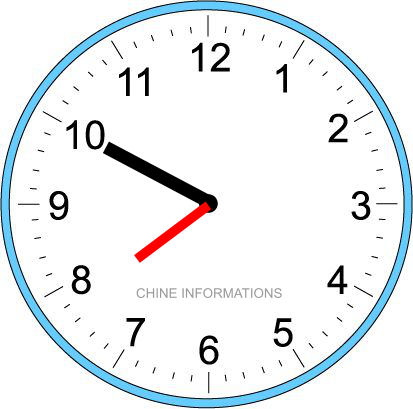
- Chinese Gratis -